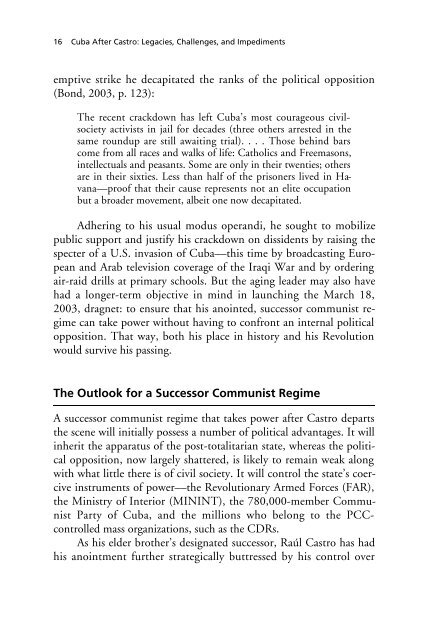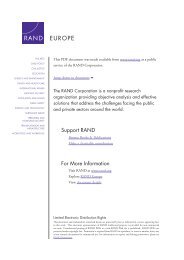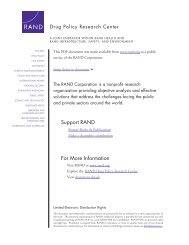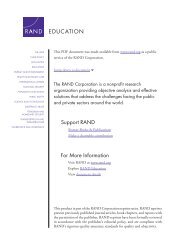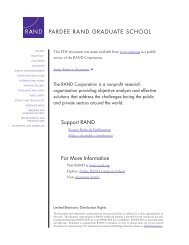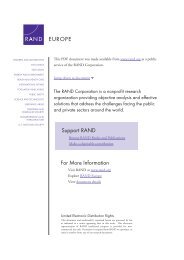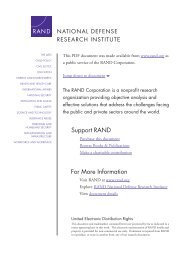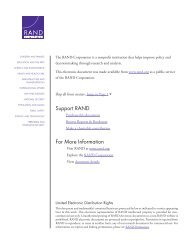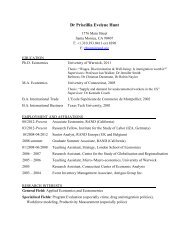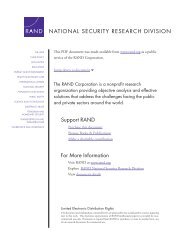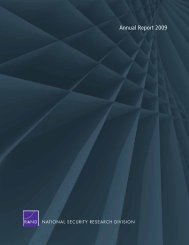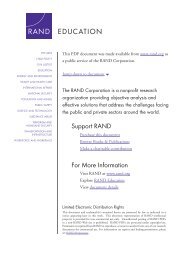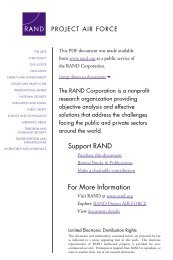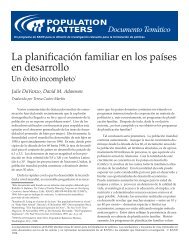Cuba After Castro - RAND Corporation
Cuba After Castro - RAND Corporation
Cuba After Castro - RAND Corporation
You also want an ePaper? Increase the reach of your titles
YUMPU automatically turns print PDFs into web optimized ePapers that Google loves.
16 <strong>Cuba</strong> <strong>After</strong> <strong>Castro</strong>: Legacies, Challenges, and Impediments<br />
emptive strike he decapitated the ranks of the political opposition<br />
(Bond, 2003, p. 123):<br />
The recent crackdown has left <strong>Cuba</strong>’s most courageous civilsociety<br />
activists in jail for decades (three others arrested in the<br />
same roundup are still awaiting trial). . . . Those behind bars<br />
come from all races and walks of life: Catholics and Freemasons,<br />
intellectuals and peasants. Some are only in their twenties; others<br />
are in their sixties. Less than half of the prisoners lived in Havana—proof<br />
that their cause represents not an elite occupation<br />
but a broader movement, albeit one now decapitated.<br />
Adhering to his usual modus operandi, he sought to mobilize<br />
public support and justify his crackdown on dissidents by raising the<br />
specter of a U.S. invasion of <strong>Cuba</strong>––this time by broadcasting European<br />
and Arab television coverage of the Iraqi War and by ordering<br />
air-raid drills at primary schools. But the aging leader may also have<br />
had a longer-term objective in mind in launching the March 18,<br />
2003, dragnet: to ensure that his anointed, successor communist regime<br />
can take power without having to confront an internal political<br />
opposition. That way, both his place in history and his Revolution<br />
would survive his passing.<br />
The Outlook for a Successor Communist Regime<br />
A successor communist regime that takes power after <strong>Castro</strong> departs<br />
the scene will initially possess a number of political advantages. It will<br />
inherit the apparatus of the post-totalitarian state, whereas the political<br />
opposition, now largely shattered, is likely to remain weak along<br />
with what little there is of civil society. It will control the state’s coercive<br />
instruments of power––the Revolutionary Armed Forces (FAR),<br />
the Ministry of Interior (MININT), the 780,000-member Communist<br />
Party of <strong>Cuba</strong>, and the millions who belong to the PCCcontrolled<br />
mass organizations, such as the CDRs.<br />
As his elder brother’s designated successor, Raúl <strong>Castro</strong> has had<br />
his anointment further strategically buttressed by his control over


